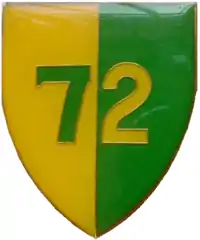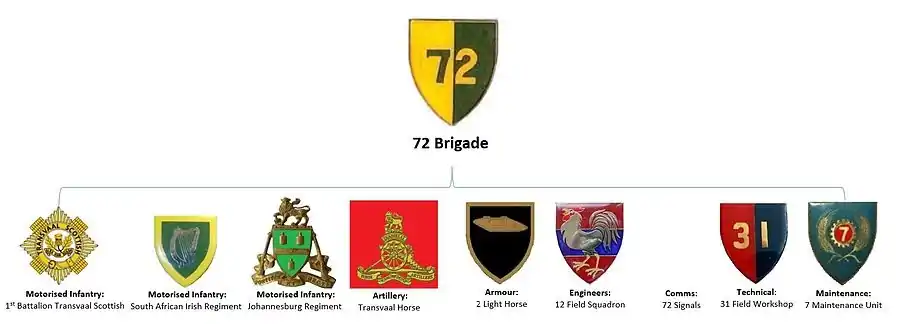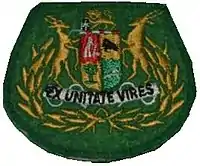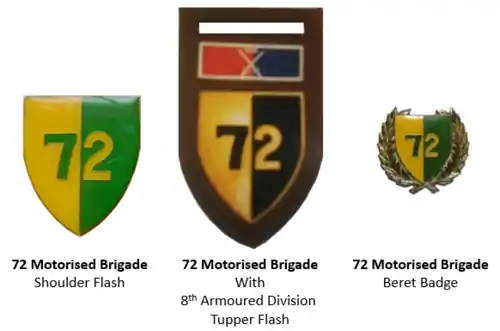72 Motorised Brigade (South Africa)
72 Motorised Brigade was a Formation of 7th Infantry Division (South Africa), a combined arms force consisting of infantry, armour and artillery.
| 72 Motorised Brigade | |
|---|---|
 72 Motorised Brigade emblem | |
| Active | 1974–1992 |
| Country | |
| Allegiance | |
| Branch | |
| Type | Motorised Brigade |
| Part of | South African Composite Brigade |
| Garrison | Kensington |
| Nickname(s) | 72 Mot |
| Equipment | |
| Engagements | South African Border War |
| Insignia | |
| 72 Mot Brigade Command Bar | |
History
18 Brigade
72 Brigade can trace its origins back to a structure in the late 1960s, called 18 Brigade, which was headquartered in Kensington. On 1 August 1974, through a reorganization of the Army’s conventional force, the name was changed to 72 Motorised Brigade.[1]
Initial Structure
Under this reorganisation, the following units were transferred from Witwatersrand Command to the new command:
- Transvaal Scottish Regiment, 1st Battalion
- South African Irish Regiment,
- Johannesburg Regiment,
- 1 Light Horse Regiment,
- Transvaal Horse Artillery,
- 12 Field Squadron,
- 72 Signal Squadron,
- 7 Maintenance Unit,
- 31 Field Workshop and
- 5 Field Ambulance.

Higher Command
During its period 72 Motorised Brigade resorted at different stages under the 7 and 8 Divisions.

Brigade Training and Exercises
72 Motorised Brigade would generally make use of the General de Wet Training Range, Tempe, near Bloemfontein. Notably 72 Motorised Brigade was involved in Exercise Thunder Chariot, a Divisional exercise held since 1956, at the Army Battle School. Other exercises included:
- Exercise de Wet 2 in April and May 1975
- Exercise Quicksilver in May 1978 in the Kimberly-Schmidtsdrift-Douglas area
- Exercise Eagle Hill 1 in April 1979 at Lohatla
Operational Activation
As a Citizen Force structure, 72 Motorised Brigade would make use of call-up orders for its personnel to generally report for 3 months service. Headquarters staff would then leave for Tempe near Bloemfontein, where a transfer camp would be established to process troops en route to the operational area in northern South West Africa. Processing of units would include personal documentation, a medical examination, inoculation and the issuing of equipment and weapons. Each unit on completion of the necessary processing, would entrain to the Olienhoutplaat Station for a six-day journey to Grootfontein, the railhead near the Operational Area.
South West Africa and Angola
In January 1976 72 Motorised Brigade was mobilised mainly to protect the Ruacana/Caluque Water scheme in the Cunene River. Colonel S.W.J. Kotze took control of the Brigade at that stage. On 27 March 1976, the formation returned from Angola.
The rear headquarters
By 1978, the Brigade took over 1 Mobilisation Centre in Pretoria as its Rear Headquarters.
73375198 PE
72 Motorised Brigade received the Freedom of Johannesburg on 16 February 1980.
Insignia

Leadership
- Brigadier S.J. Terblanche 1974
- Colonel S.W.J. Kotze 1976- 1980
- Colonel E. Webb 1980
See also
 South Africa portal
South Africa portal